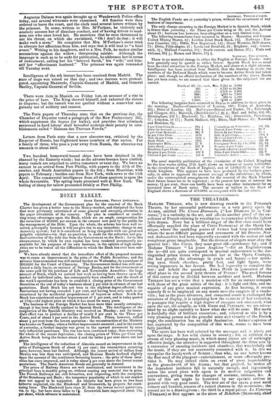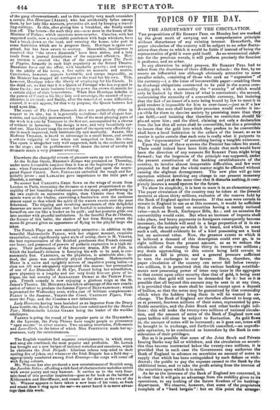THE THEATRES.
MADAME Triumoir, who is now drawing crowds to the Princess's Theatre, by her successful performance in a very pretty opera by ADDER, entitled The Crown Diamonds, (" Les Diamans de In Con- ronne,") is a curiosity in the art, and affords another proof of the ex- cellence of French training in vocalization in connexion with the lighter lyric drama. None but a brilliant singer of the first class could have effectually supplied the place of Crisaa DasroitEau at the Opera Co- mique, where the sparkling genius of A USER had long presided, and where the most difficult passages and ornaments of his Domino Noir and Ambassadrice had been repeatedly executed with the easiest air and completest grace imaginable. But the divinest of singers must obey the general law ; like CINTI, they must grow old—perchance fat ; and if Madame Tammy " La jeune Anglaise "—for an Englishwoman she is—did not quite correspond in musical endowments to the dis- tinguished prima donna who preceded her at the Opera Comique, she had greatly the advantage in youth and beauty — her spark- ling eyes, blonde chevelure, pretty foot, and light figure, were strong arguments in her favour. She had ingenuity to complete the rest ; and behold the quondam ANNA HUNT in possession of the chief place in the second lyric theatre of France ! The good fortune of this career may be divided between accident and merit. Madame Tarixosi has not a voice that a musician will for an instant compare with those of the great artists of the day : it is light and thin, and in- capable of any great musical expression. At first hearing, it seems scarcely fit to be employed on any music save the couplets of a vaude- ville; but as the piece advances, and concerted music is exchanged for occasions of display, it is surprising how the neatness of her execution, in passages that require a high degree of compass and command, wins upon the ear, till actually, as with Gana and PEBSIANI, we are stimu- lated by no slight curiosity to know what she will do next. Her merit is decidedly that of brilliant execution ; and, coloured as this is by a very pleasing person and the graceful mien and vivacity of the French Stage, the combination has no slight fascination. AtruEn's opinion of her, expressed by the composition of this work, seems to have been fully justified. The opera has been well selected by the manager, and is nicely put upon the stage. It has solid claims to novelty; for, in addition to a stream of very pleasing music, in which many pieces are of strikingly effective design, the attention is supported throughout the three acts by a succession of amusing incidents and situations, that wonderfully aid the music, if they are not necessarily connected with it. In this we recognize the handywork of SCRIBE; than who, no one better knows the first need of the playgoer—entertainment, or more effectually tiro- vides it. He may indeed claim an event of great improbability as the groundwork of his drama ; but that granted, he makes all the dependent incidents fall in naturally enough, and ingeniously unites the acted piece with opera in its modern exigencies and conventions giving room for changes of costume, tableaus, &c. A little of this art might be borrowed by our operatic scribes in general with very good result. The first act of the opera passes amid coiners and banditti, tenants of a ruined chateau in the mountains ; the Second act in a drawingroom ; the third in a royal palace. La Catarina (TarmoN) at first appears as the niece of .Rebolledo (BEDroaD), chief of the gang aforementioned; and in this capacity very much astonishes a certain Don Henrique (ALLEN), who has accidentally fallen among them, by her lady-like manners, protective air, and by keeping a travel- ling-carriage. In In this, after giving him a breakfast, she finally rends him off. The lovers—for such they are—next meet in the house of the Minister of Police; which occasions more surprise. Catarina, with her supposed uncle, now a respectable gentleman with huge whiskers, have had a break-down on the road, and entering the house, take part in some festivities which are in progress there. Henrique is again sur- prised, but has been sworn to secrecy. Meanwhile, intelligence is received that "the crown diamonds" have been stolen, and a lady reads from a journal descriptions of the supposed offenders. Here an interest is created like that of the amusing piece The Perils of Pippins, formerly in such high popularity at the Strand Theatre. BEDFORD faces out the affair, with laughable gravity ; and conveys, in the oddity of his tones, a fine satire on manners and morals. Conviction, however, appears inevitable, and escape impossible, as the Minister has stopped all carriages on the road but his own. This, however, Henrique takes the liberty of employ ing for his friends. In the third act, we find that it is a Queen of Portugal who has engaged in these freaks ; her main business being to pawn the crown diamonds for a certain object of state benevolence. When Don Henrique beholds in the person of Catarina his liege lady and sovereign, the summit of tnys- tification is athined ; and finally, after the removal of some difficulties, created, it would appear, for that very purpose, the Queen bestows her hand upon him.
The music of The Crown Diamonds does not particularly shine in respect to its airs ; but it is generally mclodious—full of elegant har- monies, and tastefully instrumented. One of the most pleasing parts of the work is a solo by Tnu.LoN in the first act, accompanied by a chorus of robbers in harmony. The design is new, and very beautifully car- ried out. Miss GRANT sang the second part of the opera very effectively: she is much improved, both histrionically and musically. ALLEN, like Madame Tnnton, is heard to advantage in a small house, and avoids a certain vulgarity of tone when not compelled to force his voice. The opera is altogether very well supported, both in the orchestra and on the stage ; and its performance will insure the lover of novelty in dramatic music a very pleasant evening.



























 Previous page
Previous page